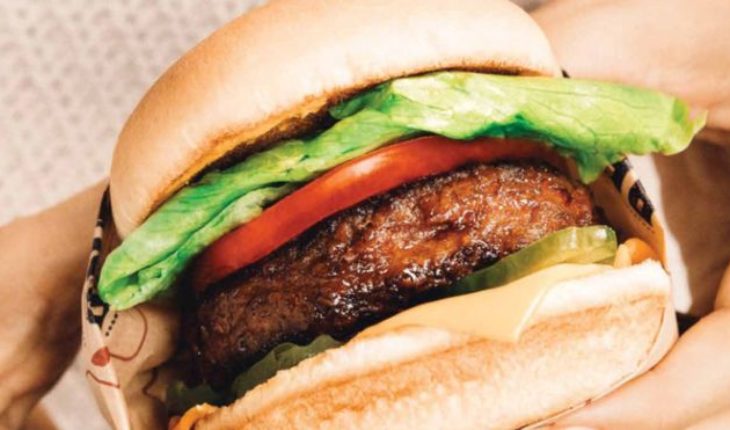Investors want to eat vegan meat (or at least you Nerla in your portfolio.
While the Silicon Valley impossible Foods Company has raised more than US $750 million enthusiastic investors with its vegetable meat products, beyond meat (beyond the beef, English) firm surprised the world of Business when he went to the stock market on Wall Street a couple of weeks ago.
His shares rose 163% on the first trading day, leaving the company that produces vegan burgers with a market valuation of US $3.8 billion and its founders with an indelible smile.
“We understand the composition of the meat, we understand its architecture and year after year we close the gap between our product and the animal protein,” said Ethan Brown, founder and CEO of the Californian company.
Beyond Meat manufactures burgers that look and taste like meat, but with a vegetable base.
In Search of meat burger (meat free) perfect and ecological
It uses proteins from peas, beans and soybeans, to which they add vegetable fibers. Then the ingredients are subjected to several processes of vaporization, pressure and temperature changes to achieve the resemblance to the meat.
Demand for vegan meat
Vegetable substitutes for meat have gained popularity, as more and more people adopt vegetarian or vegan diets, either for health reasons, to reduce the pollution caused by intensive livestock farming or to protect animals.
As consumers ‘ appetites grow, competition in a market that is estimated to reach US $5.800 million is increasing in 2022, according to a study by the market analysis firm Grand View Research.
The actions of the vegan meat company Beyond Meat rose 163% in its market debut. Only in the United States did the sales of meat substitutes increase 42% between March 2016 and March 2019, reaching nearly US $900 million, according to Nielsen consultancy, while traditional meats increased by only 1% in the same period.
And in other developed economies the trend is similar. In the United Kingdom, for example, the sale of alternative Meats increased 18% last year, while traditional meat sales fell by 2%.
An “impossible” bet
Recently, the fast food chain Burger King started selling in some restaurants-as a pilot-a vegetarian burger of impossible Foods christened as Impossible Whopper.
With this alliance impossible Foods seeks to mass a product that has so far been niche, but with the backing of athletes like Serena Williams and celebrities like Katy Perry, has begun to expand its borders.
Impossible Foods ‘ vegan burgers are sold in restaurants and fast-food chains like Burger King. Their vegan burgers are made from a genetically modified yeast that generates the key ingredient: heme, which gives the appearance Juicy and the appearance of having blood while cooking, unlike traditional vegan meats.
The other ingredients include wheat proteins, soybeans and potatoes.
The race to produce artificial meat and how it can change the way we eat
Although currently sold in more than 7,000 restaurants around the world, the company plans to launch its products in supermarkets in the United States in the second half of this year.
Among the major investors behind the project are Bill Gates, Khosla Ventures, Google Ventures, Horizons Ventures and Open Philanthropy Project.
“Beyond the Flesh”
Beyond Meat specializes in selling burgers, sausages and other meat substitutes to supermarkets.
As in the United States about 5% of the population is vegetarian, their challenge is to enter to compete directly in the market of meat eaters.
Leonardo DiCaprio is one of the investors in Beyond Meat. That is why it has been determined that the products have the same texture, color and taste of the animal meat.
Its plan is to increase the variety of products, including pork and chicken meat with ingredients made from amino acids, lipids and trace minerals derived from plants.
Beyond Meat, the company that wants to redefine the concept of hamburger
Beyond Meat has about 28,000 points of sale, mainly in the United States, although it has also entered the markets of Canada and Europe.
Bill Gates is also among the company’s investors, as well as the actor Leonardo DiCaprio.
Giants fight
So much faith has investors in the vegetable meat market, which companies like Tyson Foods, the largest meat processor in the United States, also plans to launch its own version of vegetable protein-based products in the coming months.
And even Mcdonald’s is selling vegan burgers in Germany and Sweden.
Why (and how) Mcdonald’s created a meat-free hamburger that only sells in Sweden
Despite the positive signs of the market, some analysts have warned that the frenzy for vegan meat could become a bubble, if too many competitors enter the same market.
Vegan burgers with meat flavor and appearance have plant origin, while artificial laboratory meat comes from stem cells. Is it the same as synthetic meat?
Does vegan meat have anything to do with synthetic meat produced in the laboratory?
Not really. This is another business, which aims to create artificial meat (non-vegan) through the cultivation in laboratory of bovine stem cells and that still does not reach the supermarkets.
That may be another player who in the future enters the market to dispute his own slice.
In fact, the firm Just hopes to sell its laboratory chicken meat in the United States at the end of 2019.
However, the expansion of the business can be found with certain regulatory obstacles.
The American Cattlemen’s association claims that the word “meat” should only be used in products containing “the fabric or meat of animals that have been slaughtered in the traditional manner”.
While the European Union has received proposals to restrict the use of words such as hamburger or sausage to products of exclusively animal origin.
In fact, France prohibits the use of “deceptive” labels on vegetarian products because they confuse people.
The way in which these and other conflicts are resolved, will affect the speed of growth of a market that until now appears as a new promise in the food industry.
translated from Spanish: The explosive growth of the business of “vegan meat” where they have invested celebrities like Bill Gates and Leonardo DiCaprio
May 21, 2019 |





